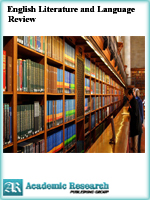English Literature and Language Review
Online ISSN: 2412-1703
Print ISSN: 2413-8827
Print ISSN: 2413-8827
Quarterly Published (4 Issues Per Year)

Archives
Volume 8 Number 1 September 2022
The Effectiveness of Teaching Idioms in Electoral Speeches
Authors: Anahit Hovhannisyan
Pages: 11-21
DOI: doi.org/10.32861/ellr.81.11.21
Abstract
There has been a considerable amount of interest in the study of idioms. English is a language with a vast idiomatic basis, which makes its learning very exciting and intriguing. Idioms, constitute a notoriously difficult area of foreign language learning and teaching. The sheer number of idioms and their high frequency in discourse make idioms an important aspect of vocabulary acquisition and language learning in general. Nowadays language learning is based on the need for interaction with others. This research aims to respond to a need for a proper method of teaching election idioms to High School students. From the growing body of this research, it follows that applying cooperative techniques for teaching election idioms, can improve learning outcomes and can also effectively improve language communication. The results of the pre-test and pro-test show that the cooperative method of teaching election idioms turned out to be more effective than the competitive method in both idioms comprehension and production.
A Study on the Pragmatic Identity Construction in Acceptance Speech at Kobe’s Basketball HOF Induction by the Public Figure
Authors: Mingzhu Qin
Pages: 6-10
DOI: doi.org/10.32861/ellr.81.6.10
Abstract
On 15th May, 2021, Kobe’s widow Vanessa Bryant made an impressive acceptance speech at the Basketball Hall of the Fame Enshrinement Ceremony. This paper takes this speech as the research object and explores the well-known public figure’s pragmatic identity of Vanessa and Kobe by adopting the pragmatic theory and Verschueren’s theory of language adaptation. Through qualitative analysis, this paper found that in this speech, the speaker, Vanessa, not only constructed her own identity of a decent public speaker and a supporter, but also constructed the identity of Kobe as a strong-willed athlete, a fan-loving star, a great family man and a spiritual leader. And this dynamic identity construction in the acceptance speech is to adapt the communicative context of the public speech.
Role of Translation in Concluding International Agreements and Preserving International Law: A Case Study of Translating International Law into Arabic
Authors: Aiman Musabah Al Owaisi
Pages: 1-5
DOI: doi.org/10.32861/ellr.81.1.5
Abstract
This paper discusses international agreements as a source of international law and their relationship to the field of translation. It explores the way bilateral agreements and multilateral international agreements are drafted and how translation is involved in this process, with a focus on the English-Arabic drafting of agreements. It also examines how translation can affect the process of concluding these agreements, their interpretation after being signed, and their application. The paper also discusses the role translation plays in the consolidation of international law through international agreements. The study concludes by providing a number of recommendations to improve the practices of utilizing translation in the context of international agreements.



